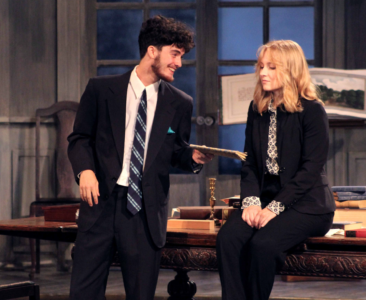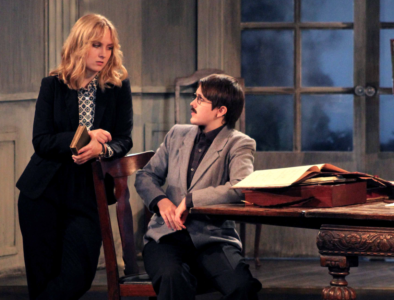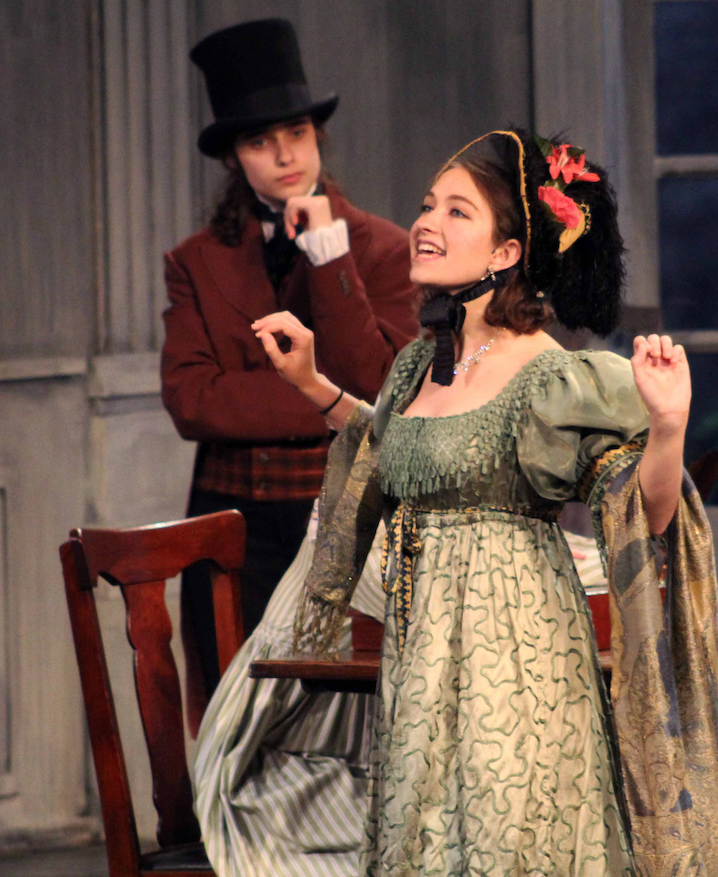Live theatre will make its grand return to Roberts Theatre this Friday, Oct. 8, with the premiere of “Arcadia” set to take the stage.
“Arcadia,” a romantic comedy written by Tom Stoppard, is set in a manor house located in the fictional Sidley Park, England. The time period of the play shifts throughout, alternating between characters in the 19th century, specifically beginning in 1809, and those in the ‘present day,’ which is never explicitly defined. Through these temporal shifts, audience members understand the interconnected story between the separate characters existing in each period, some of which are descendants of one another.
“The past is trying to interpret the future and develop formulas for understanding how the world works,” said actor Nicholas Lampietti `25. “The present is trying to do the exact same thing – they’re trying to understand the past.”
“Arcadia” touches on several themes as characters discuss or allude to topics of thermodynamics, history, math and physics, romanticism and classicism to name a few. More broadly, the play focuses on the characters’ understanding of the world around them and their relationships with one another.

“The overall message is how we try to interpret what is beyond us and how we try to make sense of the world we don’t know,” said Lampietti. On top of that, he said the play has, “a lot of sex and love, and romance. Everyone is interested in someone else, and everyone has multiple suitors.”
“It kind of looks at the foibles and inadequacies of human beings,” said Professor Emeritus Sandy Moffett, theatre and dance, who is directing the play.
Moffett came into the play’s production halfway through the rehearsal process after a change in directorship.
“I felt like my major job was to make the play happen,” said Moffett. “It’s [the actors’] show, you know, I mean they’re creating the character[s].”
Lampietti shared an adage Moffett has told the cast during rehearsals: “Doing a play is supposed to be at its core about playing, and you should be having fun, and you should be taking risks and you should be doing silly or weird things that help sort of develop momentum and energy and are able to sort of create opportunities for further growth and discovery in your character.”
Moffett directed his first play at Grinnell in 1971, but it’s been several years since he worked on his last production at the College.
“It’s just been a lot of fun to come back and see the talent that Grinnell students have, and the dedication and creativity,” said Moffett.
Erin Howell-Gritsch, Grinnell’s costume shop supervisor and costume designer on the production, spearheaded the task of deciding upon, fitting and acquiring the vast range of costumes needed for “Arcadia.” Howell-Gritsch was already familiar with “Arcadia” beforehand since she had designed costumes for the show once before as a graduate student at the University of Iowa in 1997. She also taught the play twice to students in her previous costume design classes.

The costumes, particularly for the 19th century characters, are quite elaborate and reflective of the time periods “Arcadia” takes place in. Audience members can expect to see performers donned in stand collar shirts, three-piece suits with ruffled sleeves, cravats, square-tailed coats, wigs, frilly bibs, grandiose hats and more.
“Every character has a unique touch. There’s something about them, whether it’s the type of cravat that they’re wearing or how it’s tied or, you know, how high their boots are, there are just little differences in there that really sort of pop out some of the personality,” explained Howell-Gritsch.
Lampietti plays two characters in “Arcadia.” The first is a 15-year-old boy named Augustus that he described as “a precocious little shit of a younger brother” and the second is the butler Jellaby, “the gossiper” of the group. Lampietti said the extensive nature of Jellaby’s costume – consisting of a three-piece suit, shirt, waistcoat, ascot and cravat among other pieces – is particularly challenging to wear.
“The combination of the stage lights, which are really hot, you’re wearing three layers, you’ve got a mic that you’re wearing … You definitely sort of feel a little mechanical doing it,” he said.
Cast members often change outfits throughout the course of the play, making quick backstage changes by crew members essential to the production’s success.
“It’s been one hell of a ride in terms of rehearsing,” said Lampietti.
Part of the challenge is due to the fact that not only does the play include an extensive amount of props and costume changes, but it also spans for two and a half hours. The cast and crew began tech rehearsals this past Sunday, Oct. 3 in preparation for this weekend’s premiere.
The production will take place over the course of the coming weekend, with showings at 7:30 p.m. on Friday and Saturday, Oct. 8 and 9, as well as 2 p.m. on Sunday, Oct. 10. The in-person performance in Roberts Theatre is free and open to Grinnell College students, faculty and staff. P-Cards are required to receive a ticket.
Tickets will be available free of charge from the ticket booth located in the lobby of Bucksbaum Center for the Arts. Some tickets may be available at the Will Call counter before the start of each performance. Masks are required for audience members.
The show will also be available virtually via a livestream viewing.
Howell-Gritsch is particularly excited for the Grinnell College community to have the opportunity to experience theater in-person once again.
“It’s just so different than watching something online, to be next to people who are also laughing or going, ‘Wait, what did they say?'”
Lampietti is also eager for the Grinnell College community to engage with and reflect on the production.
“The best theater is after you leave the room … you’re asking questions about yourself, and your community and the world,” said Lampitetti. “This is definitely a show that will leave you with a lot of those questions.”

























































